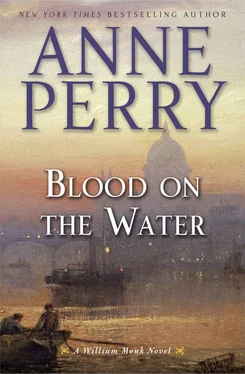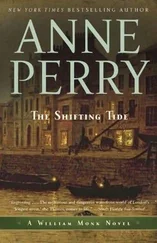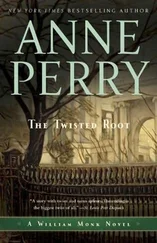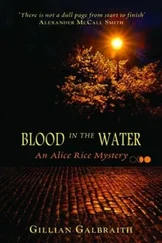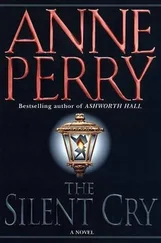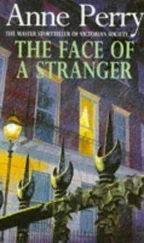Anne Perry - Blood on the Water
Здесь есть возможность читать онлайн «Anne Perry - Blood on the Water» весь текст электронной книги совершенно бесплатно (целиком полную версию без сокращений). В некоторых случаях можно слушать аудио, скачать через торрент в формате fb2 и присутствует краткое содержание. Год выпуска: 2014, ISBN: 2014, Издательство: Random House Publishing Group, Жанр: Исторический детектив, на английском языке. Описание произведения, (предисловие) а так же отзывы посетителей доступны на портале библиотеки ЛибКат.
- Название:Blood on the Water
- Автор:
- Издательство:Random House Publishing Group
- Жанр:
- Год:2014
- ISBN:978-0-345-54844-3
- Рейтинг книги:3 / 5. Голосов: 1
-
Избранное:Добавить в избранное
- Отзывы:
-
Ваша оценка:
- 60
- 1
- 2
- 3
- 4
- 5
Blood on the Water: краткое содержание, описание и аннотация
Предлагаем к чтению аннотацию, описание, краткое содержание или предисловие (зависит от того, что написал сам автор книги «Blood on the Water»). Если вы не нашли необходимую информацию о книге — напишите в комментариях, мы постараемся отыскать её.
Blood on the Water — читать онлайн бесплатно полную книгу (весь текст) целиком
Ниже представлен текст книги, разбитый по страницам. Система сохранения места последней прочитанной страницы, позволяет с удобством читать онлайн бесплатно книгу «Blood on the Water», без необходимости каждый раз заново искать на чём Вы остановились. Поставьте закладку, и сможете в любой момент перейти на страницу, на которой закончили чтение.
Интервал:
Закладка:
“Yeah, summink like that,” Scuff agreed, resting one foot on an old timber. “Want ter talk to yer. I’ll get yer a decent pie an’ a cup o’ tea.”
“Wi’ wot?” Mucker asked suspiciously. Then he took a second look at Scuff’s jacket and trousers and decided he was possibly on to a good thing. “Yeah, if yer want. But I ain’t rattin’ on nobody.”
“Know anyone who were drowned in that boat what blew up?” Scuff asked casually.
Mucker’s bushy eyebrows shot up. “Jeez! No. Do you? Yer gone up in the world, ain’t yer? They was all toffs!”
“Crew as well?” Scuff asked drily.
“No, course not.” Mucker stopped abruptly. “Why’d yer want to know? Wot’s it ter you?”
Scuff was prepared for that one. He smiled. “Making my way,” he replied. “Wouldn’t rat on a friend, past or present. But I reckon as someone ’oo’d blow up two hundred people ’oo are just ’aving fun is no friend of anyone on our river. Would you?”
Mucker did not even hesitate. “No. It’s bad for everyone. So wot d’yer think yer goin’ ter do about it, then?”
“Boat picked up all these people at Westminster Bridge. Where’d it come from before that? Who got on wi’ explosive stuff and set it in the bow?”
“ ’Ow d’you know it were in the bow?” Mucker asked instantly.
“ ’Cos I know someone ’oo was on the river an’ saw it go up. Anyway, stands to reason. It went down bow first, not broke its back. They’re pulling it up now.” He waved his arm in the general direction of the wreck.
“Wot’s it worth?” Mucker asked bluntly. “More’n a cup o’ tea?”
“A blind eye now and then, when you need it,” Scuff replied without hesitation. He had seen that one coming, too.
Mucker grinned. “I always thought you was a fly little sod,” he said cheerfully. “Right-ye’re on. Come back termorrer.” He turned back to his work dismissively and resumed sorting through his find.
Scuff had never imagined he could learn enough in one day. School would have to be forfeited tomorrow and maybe the day after as well. He slapped Mucker on the shoulder in agreement. The promise was made. He might have to ask Hester for money for more pies, but he’d deal with that one only if he had to.
The next person he looked for was a bargee that he had known when he was a mudlark. Again, it took several moments before the man recognized him, and Scuff had to bite his tongue not to apologize for his good fortune. He gave the same reason for wanting to know about the wreck of the Princess Mary : that it was bad for the river.
“They’ll be coming around asking everyone on the river what they know,” he said reasonably. “If they think of it.”
The bargee was busy splicing ropes. His gnarled fingers grasped the shiny hook and wove it in and out almost as if the task needed no thought. Scuff had seen old women knit the same way.
“River Police’ll think of it,” the bargee said with a downturn of his mouth. “Got their long bloody noses into everything. Still, according to old Sawyer down the way-an’ ’e’s ninety if ’e’s a day-it used ter be a lot worse, before they came.”
Scuff was startled. “When was that?”
The bargee grinned. “Afore your time, son. In the 1790s, or thereabouts. When the French were all cutting each other’s ’eads off. Told yer, ’e’s ninety or more. Says the river were the worst place in the world then. Pirates all over the place. Murder was as common then as thievin’ is now. An’ thievin’ were as common as takin’ a breath of air. So what is it yer want, then?”
“Could anyone ’ave got that stuff to blow them up an’ put it in when they were on the river?” Scuff asked. “After dark, like? Or did it ’ave ter be when they was tied up somewhere? Like Westminster Bridge, or Gravesend?”
“Yer sayin’ as maybe one of us did it?” The bargee’s face was suddenly hard, his eyes angry.
“No I in’t!” Scuff snapped back. “What d’yer take me for? I know that. And like as not, the River Police know. But they in’t in it, are they! It’s bin taken off them and given to the regular land police, ’oo don’t know nothin’!”
The bargee glared at him, the splicing hook idle in his hand for a moment.
“An’ ’ow do you know that, then?” he demanded. Scuff had his complete attention now.
“I know a lot o’ things,” Scuff replied darkly. “An’ the sooner we get this sorted, the sooner we’ll ’ave the reg’lar police off our river and get our own police back, what we know ’ow ter deal with.”
“You cunning little sod!” the bargee said with feeling. He looked Scuff up and down again, this time taking more notice of his clothes, and particularly his boots.
Scuff wanted to tell him he had not earned them himself, but that would have destroyed what little respect this man had from him, so he smiled and said nothing.
He continued all day, searching out people he had known, either directly or by repute. He visited an “opulent receiver,” a fencer of stolen goods who specialized in small and valuable pieces: jewelry, carvings in ivory, miniature portraits, and other easily hidden things worth a lot of money. Already several items had turned up, taken from the corpses that had washed onto the shore. Scuff thought robbing the dead was despicable. But he also knew hunger, cold, fear, and loneliness, and hated them; his experience made him slower to judge, and allowed him to hide his disgust. On the one hand it was like being a carrion animal; on the other, the dead had no more need of treasures, and to the living they could mean the difference between survival and death.
He must be home in time for dinner, but not because he could not go without eating. He could, and had. But if he were late Hester would want to know where he had been and he would have to come up with a very good explanation. He had no idea how she did it, but she was uncannily excellent at knowing when he was bending the truth.
Therefore he spent another few pence going back across the river in order to be able to walk up the hill to Paradise Place not so very long after he should have done were he coming home from school.
Had he accomplished anything? Possibly not. He had asked a lot of questions, trying to find out where the man with the explosives could have got into the boat, and learned that it would have been almost impossible anywhere in the first half of the voyage, partly because it would have been daylight, and to do anything unusual then would’ve been terribly risky.
But the explosives could have been loaded at Gravesend. How could he find out whether they had? Gravesend was miles away, down the estuary toward the sea.
His legs ached as he walked up the hill away from the ferry landing. He had become unused to being on his feet all day. He might be learning all kinds of interesting, useless things at school, but he was also getting soft.
He passed an old woman he knew and smiled at her. She pursed her lips and shook her head, but she wished him a good evening.
“Evenin,’ ma’am,” he answered politely. He was nearly home.
Who would do such a terrible thing as blow up a boat full of normal people, and in such a way that almost all of them drowned? Why? Did whoever had done it know that was what would happen? Of course! You put explosives in the bow of a ship, any fool knows it will sink. And any fool knows that all the people below deck will drown because there is no way on earth for them to get out in time.
He stopped still as if he had walked into a wall. That was it! It didn’t matter where the bomber got into the boat! Anywhere would do. But it mattered more than anything else where he got off! He must have known when it would explode. It was a horrible way to die-he would have left the ship before that! But where? And how? Someone swimming in the river would surely draw attention. Apart from the fact that hardly anyone could swim, the water was filthy enough to poison you.
Читать дальшеИнтервал:
Закладка:
Похожие книги на «Blood on the Water»
Представляем Вашему вниманию похожие книги на «Blood on the Water» списком для выбора. Мы отобрали схожую по названию и смыслу литературу в надежде предоставить читателям больше вариантов отыскать новые, интересные, ещё непрочитанные произведения.
Обсуждение, отзывы о книге «Blood on the Water» и просто собственные мнения читателей. Оставьте ваши комментарии, напишите, что Вы думаете о произведении, его смысле или главных героях. Укажите что конкретно понравилось, а что нет, и почему Вы так считаете.
